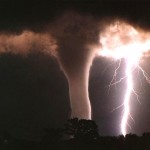My youngest son was planning our July canoe trip and we wanted to get a "reliable" long range forecast. So, with complete trust, I searched for my favourite weather report by typing in "Environment Canada long range weather forecast". To avoid the Google fiasco, I had just started using DuckDuckGo as my search engine, and up popped a site titled, "Weather in Canada Observer" with the explanatory subtitle: "The long range weather forecast issued by Environment Canada is vital to the economy."
Now, whenever you see an opening like that on a site supposedly belonging to Environment Canada (EC), one of two things have happened – either the Harper government has completely subjugated the EC staff, or it's a wannabe site using EC links to disguise the real agenda. Curiosity got the better of me and I clicked on the site. I was immediately drawn to his sidebar titled: "Climate Change?" which blares a banner headline: "Causes Of Global Warming A Raging Debate! There is strong disagreement on the real causes of global warming!" Having been immersed in synthesizing climate change data for the last 35 years, all my warning flags went up.
Turns out, this in NOT an Environment Canada (EC) website although it makes enough references to EC, cleverly stating in bold print that the "official version" of the weather forecast is produced by EC. This is a private site, run by moderator Claude Jollet, an entrepeneur who claims to be a former planning advisor to major industrial and commercial clients, specializing in weather related operational planning issues. He currently promotes web-based publishing.  He claims to hold a B.Sc. specializing in business process analysis and automation. On his LinkedIn page, he also claims to have received his education from the Environment Canada School of Meteorology from 1966-1974 (there is no Environment Canada School of Meteorology) when he was actually working for the Ministry of Transport. So just how good is the weather science on this site?
He claims to hold a B.Sc. specializing in business process analysis and automation. On his LinkedIn page, he also claims to have received his education from the Environment Canada School of Meteorology from 1966-1974 (there is no Environment Canada School of Meteorology) when he was actually working for the Ministry of Transport. So just how good is the weather science on this site?
There is no doubt that Mr. Jollet has a passion for weather, affectionately referring to himself as "the weather guy", and is obviously having a lot of fun in his retirement posting his blogs. However, his claims that he worked with Environment Canada for somewhere between 15 or 17 or 31 years (depending on which part of his site you research) – are simply not true. Mr. Jollet did, to his credit, take meteorlogical courses while working with the Ministry of Transport back in the '60's and '70's, and did take two courses through Environment Canada in the '80's, but, alas, Mr. Jollet is neither a meteorologist nor a climate change scientist. The science does not pass the sniff test of the 3 P's – practicing, published, and peer-reviewed.
Mr. Jollet and I have since exchanged emails and he was courteous enough to publish my short rebuttal about climate change deniers, accompanied, of course, by his lengthy editorial essay defending his right to publish his opinion. Garbage in, garbage out as the saying goes.
Claude certainly does not appear to get his information from NASA, NOAA, the MET Centres in Hadley and Bern, nor the IPCC where over 95% of practicing, published, peer-reviewed scientists actually agree on the real causes of climate change – an acceleration of natural climate change processes caused by th e net effect of human activities. Rrather "the Observer" seems to get its science details from sources like the much discredited magazine New Scientist, a non-peer reviewed journal of science related ideas and opinions. You are what you eat; ten mililon flies can't be wrong.
Select your websites with care; I'm back to the real Environment Canada site, hoping they can succeed in their struggle to remain strong and free…
*****
Skid Crease, Caledon
NASA – National Aeronautics and Space Agency; NOAA – National Oceanic and Atmospheric Administration; MET Centres in Hadley and Bern – accredited meteorlogical centres in Europe; IPCC – UN Intergovernmental Panel on Climate Change